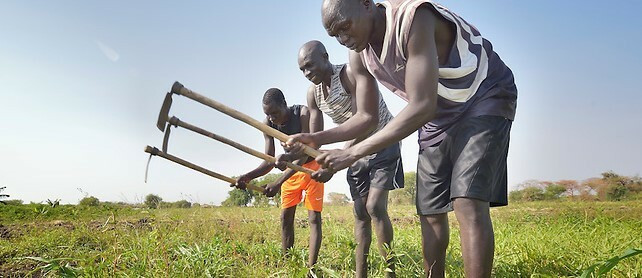The Ministry of Agriculture in the Abyei Administrative Area announced on Wednesday that the community is prepared to embark on agriculture despite facing climate change and economic hardships.
John Bol, Abyei’s Minister of Agriculture, told Radio Tamazuj that they have planned for the farming season and are determined to participate in agricultural production, despite the inevitable challenges facing his ministry and South Sudan as a whole.
“We have directed all our local farming tools to cultivation in this subsistence farming. We are seasonally ready for farming, even though there are challenges of climate change as we are still waiting for the rains to come. Abyei is an agriculturally potential land, and as people depend on traditional farming, it is the only option, so there is a need to use human efforts,” Bol said.
Bol acknowledged the economic hardships and noted that the insecurity between Abyei and Twic County in Warrap State undermines the ministry’s efforts to support production in the area.
Bol highlighted that the ministry faces significant issues due to limited resources. “We have only one tractor in somewhat good working condition because most of our equipment, including tractors, were destroyed and looted during the Abyei-Twic conflict. This is a major problem for our ministry,” he explained.
He also pointed out the shortage of agricultural inputs, particularly seeds. “Last year’s yield was poor due to the American Fall armyworms, which left us with inadequate seeds,” Bol added.
Currently, the ministry has only one partner, the United Nations Food and Agriculture Organization (FAO), which does provide seeds. Bol urged the National Relief and Rehabilitation Commission (RRC) to engage other humanitarian organizations to support FAO in filling the gap through humanitarian interventions.
Minister Bol emphasized the importance of using available resources for cultivation and cautioned against relying solely on the arrival of seeds, which could hinder the farming season. He stressed that self-sufficiency in food production is crucial for Abyei’s food security in the coming agricultural year.
Belbel Chol Akuei, a chief in the Abyei area, confirmed that farming preparations are underway but acknowledged delays in the rainy season. “Thank you, Radio Tamazuj, for asking about agriculture. The rains have not yet come in Abyei, and we have no alternative but to cultivate our lands. We cannot rely solely on relief from organizations; we must produce our own food,” he said.
Chief Belbel Chol mentioned that people in his area, Dungop, are prepared for farming, having cleared their fields and awaiting the rains. He expressed optimism that other counties are also ready to cultivate, highlighting that Abyei’s land can be effectively farmed by groups of people using traditional methods.




